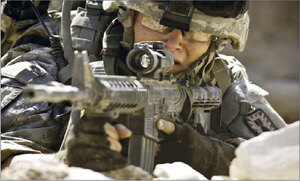Maverick director creates a harrowing war worth entering

Straight shooter· Brian Geraghty stars as Specialist Owen Eldridge in the war film “The Hurt Locker.” The film also stars Jeremy Renner and Anthony Mackie, and features Ralph Fiennes and Guy Pearce.
Nobody wants to see an Iraq war movie.
This is the current sentiment among Hollywood studio executives, who shed all hopes of garnering profit off the War in Iraq after 2007 carried a slew of desert-set, gun-toting films of epic proportions and even more epic box office failures.
The names were of A-list status — Meryl Streep and Tom Cruise in “Lions for Lambs,” Reese Witherspoon and Jake Gyllenhaal in “Rendition,” Jamie Foxx and Jason Bateman in “The Kingdom.”
The direction also boasted equally as impressive names, including Academy Award winners Robert Redford and Gavin Hood.
And even the plots were a step up from the typical explosives-loaded action flick, featuring pseudo-intellectual story lines with government officials teetering on the thin line between right and wrong from their air-conditioned offices in Washington, D.C.
Yet for all the genre revamping and celebrity pimping, these films still — perhaps appropriately — bombed.
Then there was this little film — helmed by a genre-bending female director and featuring virtual unknowns in the leading roles — quickly gaining momentum in the film festival circuit and threatening to dethrone “Saving Private Ryan” as the greatest contemporary war film.
When Kathryn Bigelow’s “The Hurt Locker” made its world premiere at the 65th Annual Venice Film Festival last September, audiences did not know what hit them — but they embraced it with a 10-minute-long standing ovation and the festival’s grand prize. Bigelow’s lo-fi epic was then off to the Toronto International Film Festival, where it was lauded by American critics, placed in the top six films of the festival and given a distribution home with Summit Entertainment.
Despite the praise and acclamations, which also included two Film Independent’s Spirit Award nominations, “The Hurt Locker” had to fight for its domestic release (now set for this Friday). And it’s a good thing it did.
Penned by freelance journalist Mark Boal, who spent several years working in Iraq, “The Hurt Locker” follows a three-person U.S. Army Explosive Ordinance Disposal (or more commonly known as the “bomb squad”) unit stationed in Baghdad, Iraq sometime in 2004.
There’s James, the unit’s wildly unconventional leader played by the electrifying Jeremy Renner; Anthony Mackie’s Sanborn, the play-by-the-rules type who finds himself constantly butting heads with James; and Eldridge, the youngest and most neurotic unit member played pitch-perfectly by Brian Geraghty.
Though Boal chose to write about soldiers, Renner’s character — a reckless thrill-seeker who would do anything for an adrenaline rush — could easily be an alcoholic, speed addict or nymphomaniac. In a way, the film is not about men behaving badly in war, but people behaving in any type of stressful, harrowing or painful situation — this one just happens to include giant EODs.

Walk alone · Kathryn Bigelow’s “The Hurt Locker” follows an U.S. Army Explosive Ordinance Disposal unit, also known as the “bomb squad,” as they fight to survive on a daily basis in war-torn Baghdad. | Photo Courtesy of Summit Entertainment
Bigelow’s perceptive direction combined with Boal’s insightful yet matter-of-fact script produces a film that is ridden with paradoxes — objective but not heartless, realistic but not documentarian, hard-hitting but not over-the-top and yes, a war film but not exactly about war.
It is this inability to describe “The Hurt Locker” with certainties and definitives that reflects the moral dilemma of war. Rather than entangling herself in political agendas or moral complexities, Bigelow lets the film — and its characters — speak for itself.
The actors never seem to have down time; they’re constantly on edge in nearly every scene, possessing a glittering fear in their eyes that never seems to fade away.
Renner has the hardest task with James, a reckless war hawk who uses his brashness to hide the slightest ounce of fear he has. As Bigelow captures James in his most intimate moments, which vary widely from playing soccer in a father-son fashion with a young Iraqi boy to taking a shower, fully clothed, to wash away blood that isn’t his, an unforeseen tenderness is revealed.
Bigelow lets these slight moments of affection cut through tension-laced scenes, and it’s the nuanced focus on the minute, even mundane details — the sharing of a juice box during a stake-out or the persistent flies buzzing along the edges of the soldier’s eyelashes — that makes “The Hurt Locker,” dare I say, real.
Super-imposed in fuzzy block lettering at the film’s start is a simple quote: “War is a drug.” Like every addiction, it’s an explicable craving that leaves its victim willingly running in circles, chasing an elusive feeling they can never quite catch.
Bigelow makes no blatant attempt to say if it’s right or wrong, and she doesn’t have to — for those on the frontline, it is what it is.
